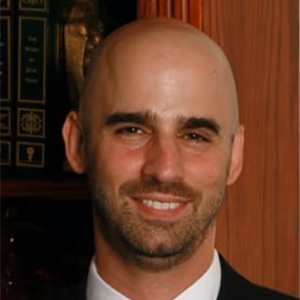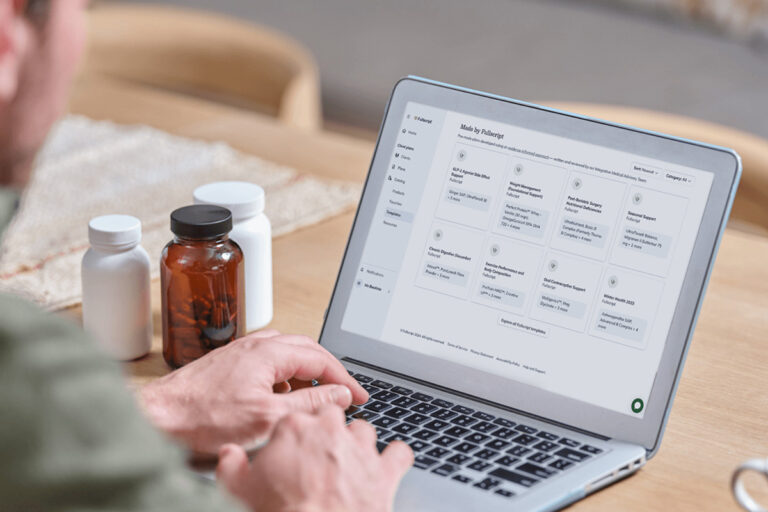The rate of suicide in the United States continues to rise. As the US population increases in average age, it is essential to note that elderly suicide attempts statistically have higher rates of completed suicide.
It should be no surprise that mental health counseling is one of the fastest-growing healthcare careers, projected to increase 19% over the next few years. As the negative stigma of mental health treatment continues to decline, more individuals are seeking help and receiving it.This article provides a guide to becoming a licensed mental health counselor (LMHC), from education and clinical experience to licensure and long-term career growth.
Whole person care is the future.
Fullscript puts it within reach.
healthcare is delivered.
Understanding the LMHC role
A licensed mental health counselor is a state-licensed professional in mental health. They typically specialize in individual and group counseling for mental health disorders and conditions.
An integral part of modern healthcare teams, LMHCs assess, diagnose, and develop treatment plans for their clients. While they cannot prescribe medications, LMHCs will often collaborate with prescribers.
The primary role of an LMHC is to provide a broad range of mental health counseling and support to patients and their families, usually as part of a larger team.

The role of LMHCs
In addition, the licensing requirements for LMHCs vary from state to state, so it is important for those interested in the field to understand the requirements in the state where they wish to practice. The American Counseling Association offers an online state-by-state reference tool.
Education requirements
To become an LMHC, students need a master’s degree. Those interested in this career need to understand the educational pathway required.
Traditional students should earn a bachelor’s degree in psychology, sociology, or social work. However, some graduate programs, such as abnormal psychology, require specific coursework.
Prospective students are encouraged to review graduate program prerequisites early in their academic journey to ensure they meet eligibility requirements.
For non-traditional students, many programs will accept transfer credits and allow students to take a handful of prerequisite courses that may be missing from their transcripts.
Each school is different, so those interested in a career change should contact the university’s department for guidance and guidelines.
It should be noted that there is no master’s degree specific to licensed mental health care workers. LMHCs can have a master’s degree in counseling, psychology, clinical mental health counseling (CMHC), or counseling psychology.
Programs can be found as Master of Arts (MA), Master of Science (MS), Master of Social Work (MSW), or Master of Education (Med).
With such a wide array of options, it is vital students find a program that is accredited through one of two organizations:
- The Council for Accreditation of Counseling and Related Educational Programs (CACREP) specifically accredits programs in counseling.
- The Masters in Psychology and Counseling Accreditation Council (MPCAC) accredits programs in both psychology and counseling.
Coursework in these programs will include classes in ethics, psychology, psychopathology, addiction therapies, trauma, and the treatment of post-traumatic stress disorder.
Gaining supervised clinical experience
Once the coursework is completed, students attend practicums and perform internships to gain clinical experience in the field.
A practicum is a short, supervised experience designed to act as a bridge between the classroom and the real world. Practicums are:
- Highly structured, often with specific goals and expectations
- Supervised by program professors or on-site staff
- Short-term, lasting a few weeks or months
- Unpaid with the student receiving credits toward graduation
An internship is focused on providing students with direct career exploration and development and giving the student work experience before graduation. Internships are:
- It is less structured than practicums and allows more independent work
- Supervised by professionals in the field who then report to the professor at the end of the internship
- Often last for several months and usually cover semester hours
- Many internships are paid, especially in the counseling community
Clinical hours for licensure must be completed within two years, and the number of hours depends on the state. For example:
- Massachusetts requires 3,360 hours of supervised clinical experience, of which 1,090 must be face-to-face contact with patients.
- Illinois requires 3,360 hours of supervised clinical experience, of which 1,680 must be in direct contact with patients.
- California requires 3,000 hours of supervised experience, but 1,750 hours must be face-to-face contact with patients.
Many states require postgraduate supervision for LMHC licensure after graduation. This involves working under the guidance of an experienced, licensed therapist who is often board-certified.
Supervision helps ensure the counselor-in-training is learning and developing ethically and professionally. It also helps develop skills, provides a safe space to discuss challenges, and ensures quality patient care.
Some states, such as Indiana, Washington, and New Jersey, also require a transitional license, known as the Licensed Mental Health Counselor Associate (LMHCA), where the junior-licensed associate works under a fully licensed LMHC as part of the professional learning process.
Navigating the licensure process
Understanding the path to licensure can be difficult, especially since each state has different requirements. Candidates should, therefore, understand their specific states’ pathways and guidelines.
Of particular importance is whether the candidate’s state requires passing the National Counselor Examination (NCE) or the National Clinical Mental Health Counseling Examination (NCMHCE). The NCE is a general exam in mental health counseling, while the NCMHCE is more clinically oriented.
Not all states will accept both exams for certification. There are specific and essential differences between the two certification tests, including:
- NCE assesses foundational counseling skills and knowledge.
- NCMHCE focuses on clinical skills, diagnosis, and treatments.
- NCE focuses on ethical, academic, and practical aspects of counseling.
- NCMHCE is a rigorous test on diagnosis, treatment plan creation, therapeutic strategies, and treatments.
- NCE is required for credentialing as a National Certified Counselor (NCC).
- NCMHCE is needed to become a Licensed Professional Counselor (LPC).
Both tests are considered rigorous, with each boasting a 40% failure rate for first-time test takers. Both charge the same $275 fee. Multiple organizations offer test preparation material and courses.
Once a candidate has passed the exam, they can apply for licensure, which usually requires submitting transcripts, supervisory reports, test results, and endorsements to a state licensing board.
Advancing through certification and continuing education
Once licensed, providers must complete ongoing continuing education units (CEU) to retain their licenses. Those who fail to do so will have to reapply for licensure, often having to retake exams.
As with the licensure process, the number of CEUs and the timeline for completing them vary by state. Massachusetts requires 45 CEUs every two years, while Illinois requires 30 CEUs every two years, and all courses are online.
One of the better ways to stay informed about the profession and where and how to receive CEUs is through professional organizations such as the National Board for Certified Counselors (NBCC) or the American Mental Health Counselors Association (AMHCA).
Multiple organizations throughout the country vary in focus and goals.
For those seeking more advanced certification, two primary national board certificates are recognized throughout the USA:
- National Certified Counselor (NCC) certification requires a professional endorsement from an LMHC, 3,000 hours of documented postgraduate clinical counseling within the past two years, and ethics training.
- The Certified Clinical Mental Health Counselor (CCMHC) designation requires holding an NCC, performing additional clinical hours, and passing the NCMHCE exam.
LMHC career paths, salaries, and future demand
Mental health counseling is one of the fastest-growing healthcare careers, with a projected increase of 19% over the next few years. In addition, salaries are beginning to reflect the need for LMHCs.
The average annual salary for an LMHC is $72,298, with some states paying close to $95,000 per year. However, this salary can fluctuate significantly based on the cost of living in the practitioner’s area.
Most LMHCs work within a healthcare center or hospital, with some working in private practice, schools, mental health clinics, or government agencies. There is also a growing use of LMHCs in the fields of youth counseling and substance abuse.
As mental illness continues to lose the negative social stigma of the past decades, there is also an ever-increasing use of LMHCs in online counseling through large national companies such as BetterHelp and Talkspace.
The growth of online counseling is significant as LMHC licenses are not consistently recognized between states. If an LMHC practices in another state without reciprocity, they could face fines, disciplinary actions, and even permanent loss of their license.
Frequently asked questions (FAQ)
Consider the following frequently asked questions about becoming an LMHC.
How long does it take to become a licensed mental health counselor?
Approximately two-to-three years, depending on the educational program and state requirements.
Can I become an LMHC without a psychology degree?
Yes, although psychology or social work degrees are preferred, the degree obtained must be in an approved field of study.
What’s the difference between an LMHC and an LPC?
LPCs focus on a broader scope of practice, including areas such as career counseling, whereas LMHCs are specifically focused on mental health treatment.
Do LMHCs prescribe medication?
No. However, they may consult with psychiatrists or physicians on medications.
What’s the fastest path to licensure for career changers?
Find out the state requirements and then ensure the school attended will accept credits from education already performed.
Is CACREP accreditation mandatory in all states?
No. Educational programs must be accredited by either CACREP or MPCAC.
Can LMHCs work independently?
Yes, although they are primarily part of a larger healthcare team.
How do LMHC salaries compare by state?
Salaries can vary significantly due to the cost of living. The national average for LMHCs is $72,298.
What are LMHC continuing education requirements?
These vary in each state but are generally around 12-15 CEUs per year, with relicensing occurring every 2-3 years.
The bottom line
- Mental health counseling is a rapidly growing field with a demand for trained, licensed professionals. The field requires a master’s degree, supervised clinical experience, and the passing of a certification exam.
- While this field grows, every state has different licensure requirements, so it is vital that those interested in a career as an LMHC become well-versed in their state’s requirements.
- While the process is rigorous, being an LMHC can be a valuable and fulfilling career. Those interested should look into their state’s guidelines, find accredited schools, and sign up for industry updates to stay ahead of the curve.
Whole person care is the future.
Fullscript puts it within reach.
healthcare is delivered.
References
- AllPsychologySchools. (2024, October 21). Mental health counselor job description (what they do). AllPsychologySchools.com. https://www.allpsychologyschools.com/mental-health-counseling/job-description/
- American Mental Health Counselors Association. (n.d.). American Mental Health Counselors Association. American Mental Health Counselors Association. https://www.amhca.org/home
- American Mental Health Counselors Association. (n.d.). Washington State LMHC and LMHCA. Washington State LMHC and LMHCA – American Mental Health Counselors Association. https://www.amhca.org/glossary/washington-lmhc-lmhca
- BetterHelp. (n.d.). Get started & signup Today. BetterHelp. https://www.betterhelp.com/get-started/
- Blake, K. (2025, January 14). Integrative approaches to mental health: Bridging the gap between traditional psychiatry and root cause medicine. Rupa Health. https://www.rupahealth.com/post/integrative-approaches-to-mental-health-bridging-the-gap-between-traditional-psychiatry-and-root-cause-medicine
- CACREP. (2025, April 14). Home. CACREP. https://www.cacrep.org/
- California Board of Behavior Sciences. (n.d.). Licensed professional clinical counselor. CA.gov. https://www.bbs.ca.gov/applicants/lpcc.html
- Careers UMBC EDU. (n.d.). What is an internship? UMBC. https://careers.umbc.edu/employers/internships/what-is-an-internship/
- Centers for Disease Control and Prevention. (n.d.). Mental health stigma. Centers for Disease Control and Prevention. https://www.cdc.gov/mental-health/stigma/index.html
- Committee on the Qualifications of Professionals Providing Mental Health Counseling Services Under TRICARE. (1970, January 1). Requirements related to the practice of Counseling. Provision of Mental Health Counseling Services Under TRICARE. https://www.ncbi.nlm.nih.gov/books/NBK259170/
- Counseling Today Archive. (2016, October 3). Preparing for the NCMHCE – counseling today archive. Archive. https://ctarchive.counseling.org/2016/10/preparing-for-the-ncmhce/
- Counseling. (n.d.). Licensure requirements for professional counselors. www.counseling.org. https://www.counseling.org/resources/licensure-requirements
- Curtin, S. C., & Garnett, M. F. (2024, September 26). Products – data briefs – number 509 – September 2024. Centers for Disease Control and Prevention. https://www.cdc.gov/nchs/products/databriefs/db509.htm
- Florida, U. of S. (n.d.). Master’s program. Licensure and Certification | RMHC. https://www.usf.edu/cbcs/cfs/academics/rmhc/masters-program/licensure-certification.aspx
- Friedmann, H., & Kohn, R. (n.d.). Apa PsycNet. American Psychological Association. https://psycnet.apa.org/record/2008-09452-005
- Gren, J., Kiraly, C., Lasocik, M., & Tyls, F. (n.d.). Back from the Rabbit Hole. theoretical considerations and practical guidelines on psychedelic integration for Mental Health Specialists. Frontiers in psychology. https://pubmed.ncbi.nlm.nih.gov/37904908/
- Howes, Dr. R. (2025, January 6). Licensed mental health counselor (LMHC) jobs & career guide 2025. PsychologyJobs.com. https://psychologyjobs.com/lmhc-jobs/
- Illinois Counseling Association. (n.d.). Illinois Counseling Association Supporting Professional Counseling in Illinois since 1948. Experience and Supervision . https://www.ilcounseling.org/page/experience_and_supervision
- Lanclos, P., & Vaughn, K. (2019, December 3). Maintaining counselor identity in interdisciplinary teams – counseling today archive. Archive. https://ctarchive.counseling.org/2019/12/maintaining-counselor-identity-in-interdisciplinary-teams/
- Legal and State Advocacy Staff; California Psychological Association. (2021, January 15). What to know about doing telehealth in a different state. https://www.apaservices.org. https://www.apaservices.org/practice/legal/technology/telehealth-different-state
- MaMHCA. (n.d.). Glossary of common acronyms. MaMHCA. https://mamhca.org/general-faq
- McPherson, A. L. (2024, November 26). The Counseling License Reciprocity Guide. Counseling Degree Guide. https://www.counselingdegreeguide.org/reciprocity/
- MPCAC. (n.d.). MPCAC. https://mpcacaccreditation.org/
- National Board For Certified Conselors. (n.d.-a). National Board for Certified Counselors & Affiliates. NBCC. https://nbcc.org/exams/nce
- National Board For Certified Conselors. (n.d.-b). National Board for Certified Counselors & Affiliates. NBCC. https://www.nbcc.org/exams/ncmhce
- National Board for Certified Counselors & Affiliates. (n.d.-c). National Board for Certified Counselors & Affiliates. NBCC. https://nbcc.org/certification/ncc
- National Board for Certified Counselors . (n.d.-d). National Board for Certified Counselors & Affiliates. NBCC. https://nbcc.org/certification/ccmhc
- National Board for Certified Counselors. (n.d.-e). National Board for Certified Counselors & Affiliates. NBCC. https://nbcc.org/
- NCMHCE 101. (2025, April 5). NCMHCE vs NCE. https://ncmhce101.com/ncmhce-vs-nce/
- Psychology.org. (n.d.). Practicums vs internships: Complete guide. Psychology.org. https://www.psychology.org/resources/internships-and-practicums/
- Public Health Online. (2021, November 18). Guide to become a licensed professional counselor (LPC). Public Health. https://www.publichealthonline.org/counseling/lpc/
- Shahwan S;Lau JH;Goh CMJ;Ong WJ;Tan GTH;Kwok KW;Samari E;Lee YY;Teh WL;Seet V;Chang S;Chong SA;Subramaniam M; (n.d.). The potential impact of an anti-stigma intervention on mental health help-seeking attitudes among university students. BMC psychiatry. https://pubmed.ncbi.nlm.nih.gov/33238951/
- Social Work License Map. (2024, May 14). Become a mental health counselor. socialworklicensemap.com. https://socialworklicensemap.com/social-work-resources/become-mental-health-counselor/
- Talkspace. (n.d.) Space to figure things out. Talkspace. https://www.talkspace.com/
- US Bureau of Labor Statistics. (2019, April 12). Substance Abuse, Behavioral Disorder, and Mental Health Counselors : Occupational Outlook Handbook: US Bureau of Labor Statistics. Bls.gov. https://www.bls.gov/ooh/community-and-social-service/substance-abuse-behavioral-disorder-and-mental-health-counselors.htm
- US National Library of Medicine. (1970, January 1). Chapter 1. Clinical Supervision and Professional Development of the Substance Abuse Counselor . https://www.ncbi.nlm.nih.gov/books/NBK64848/
- Washington State Psychological Association. (n.d.). Clinical mental health counselor salary (May 2025): WSPA. Washington State Psychological Association. https://jobs.wspapsych.org/salary/clinical-mental-health-counselor





